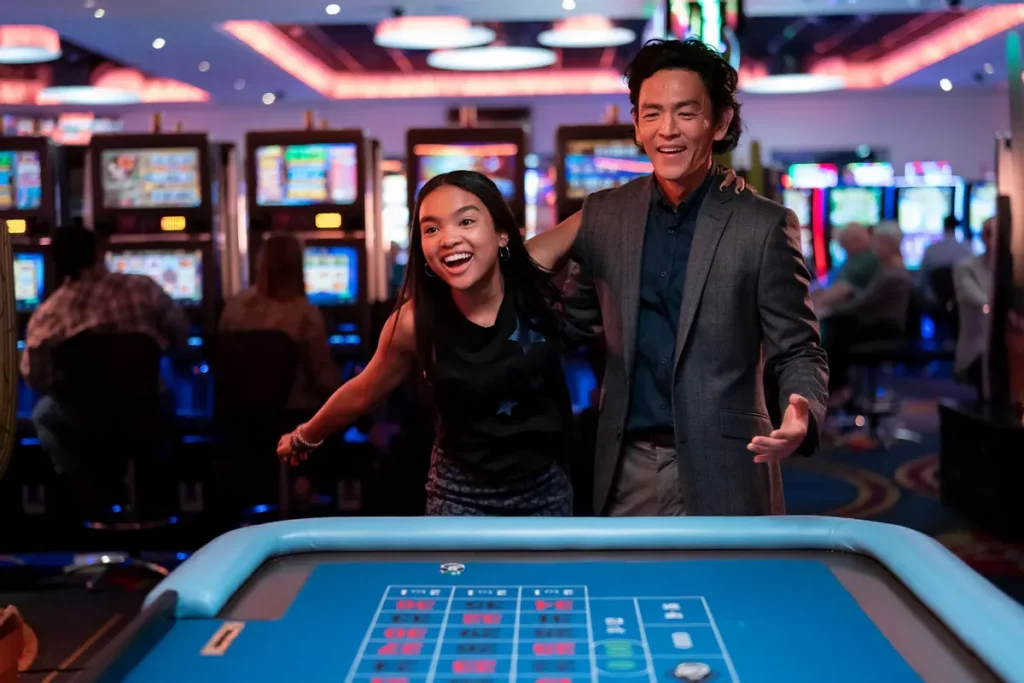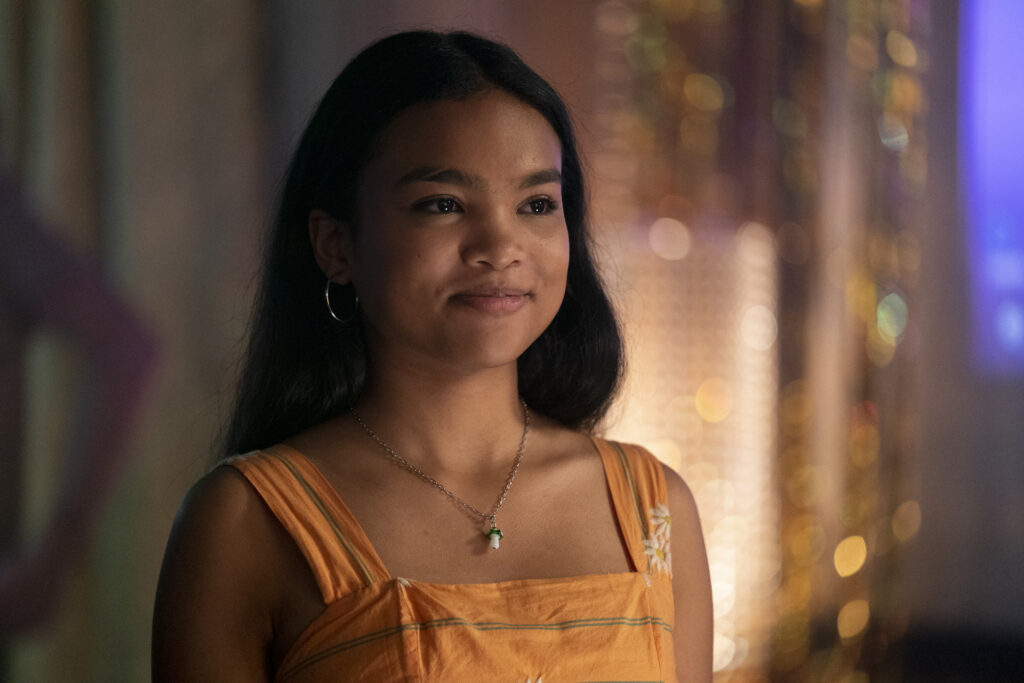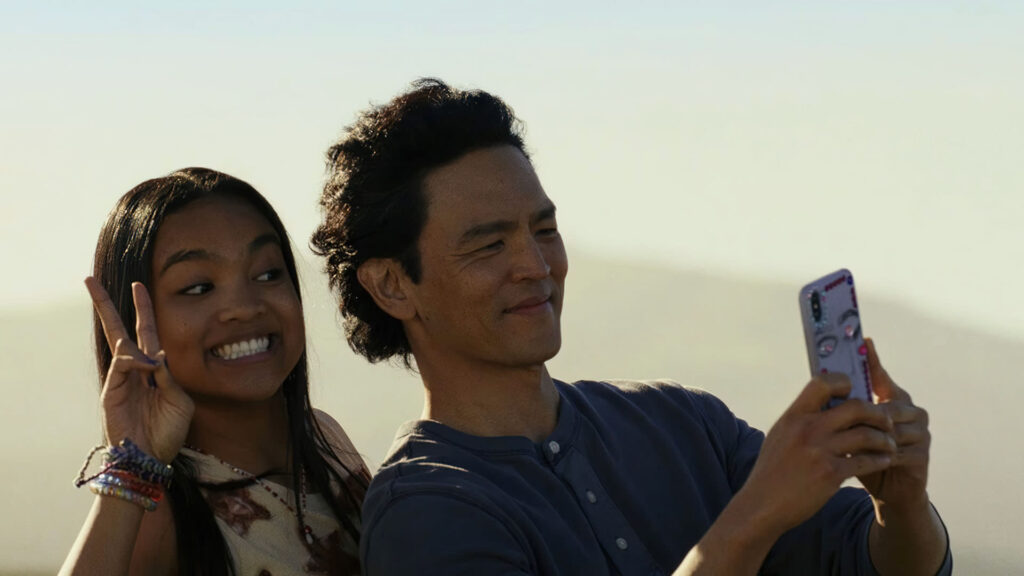You're killing me
The opening line of Don’t Make Me Go announces “You’re not gonna like the way this story ends.” This promise is not just fulfilled, but surpassed. I hate the ending of Don’t Make Me Go. But before I get into spoiler territory, allow me to make some overall remarks on the first 95 minutes of the film rather than the final 10.
Don’t Make Me Go is the third feature film directed by Hannah Marks following After Everything (which I liked) and Mark, Mary, and Some Other People (which I didn’t). But this is the first of her directing efforts featuring a script she didn’t write, and it nullifies some of the strengths of her previous films: Specifically, her savvy, bold writing that cuts out chunks of exposition and on-screen action for an unusual but pleasing rhythm. Don’t Make Me Go is a bit more conventional in structure and pace, though it’s clear that Marks sees some of her own style in the script: Like her previous films, it features a prickly relationship forged during times of trial with an uncertain future at its core. Also, like After Everything, it’s a cancer story.
Max (John Cho) is the single father of teenager Wally (Mia Isaac). They have a relationship that’s about as good as you could expect: Max is involved, caring, and kind towards Wally. He respects her boundaries, but still nervously keeps tabs on her social life. Wally, meanwhile, loves her dad, but feels a bit stonewalled, as he’s never quite known how to talk about Wally’s mother, his ex-wife Nicole (Jen Van Epps), who ran off when she was little. Max has finally started dating again, connecting with the younger Annie (Kaya Scodelario), but he feels the need to keep it secret from Wally.

After a checkup on some headaches he’s been having, Max learns he has a particularly devastating bone cancer located near his brain. He has two options: undergo a risky surgery with a 20% success rate or be assigned a life expectancy of one year. Max opts for the latter. Rather than immediately reveal his terminal diagnosis to Wally, who is prone to panic attacks and fainting, he opts to take her on a road trip to find the right moment to share the bad news. The ostensible purpose of the journey is a college reunion for Max; the real reason is to find the estranged Nicole, Wally’s mother, so Wally has someone when Max dies in the not-too-distant future.
What ensues is fairly typical of the road trip genre: Lots of shenanigans; friction and heart-to-hearts; revelations about loving each other and embracing the moment; memories to last a lifetime (even a short lifetime). And there’s the weepy undercurrent of Max living out some last moments of glory as a dad, his dreams of going on adventures with Wally no longer deferrable. It all comes to a head in the anticipated confrontations, including a couple of four-hankie tearjerker scenes.
It is a rather excellent specimen of a life-ain’t-fair, laughs-and-tears dramedy, buoyed by both the cast and by Marks. Marks’ control of the tone is terrific, ebbing and flowing in the right amounts, always cutting the sentimentality with some pepper in Max and Wally’s banter. The sweet moments are touching and life-affirming but never unctuous. And the cast is more than up to the challenge. Cho is most famous as one half of Harold & Kumar, but he’s emerged as a real actor, conveying the nuance of a stoic dad cracking at the edges, always sympathetic.
Isaac is even better. She was the most emotive and human element of the uneven satire Not Okay, and I’m delighted to see her get a proper showcase. She’s riveting on screen, perfectly believable as a tempestuous teen, her sadness and confusion blending together. She sells the big moments without overselling them.

And then we hit the final ten minutes.
I’m going to discuss the film’s conclusion from here on out, so be warned of spoilers. But I almost want you to know what you’re getting into when you turn this film on.
I fully expected a gut punch finale. I strongly suspected Marks would have no interest in directing a traditional happily ever after; it’s just not her style. So after Wally convinces Max to take a risk with the cancer surgery, even if it means an 80% chance of a life cut even shorter, I started trying to guess what the crowbar to the heart would be: Would Max’s surgery simply fail? Would he abruptly die before he could even have the surgery? Would the surgery succeed, but with Max irreparably disabled? Oh, if only.
With about ten minutes left in the runtime, there’s a happy-tears scene of Max singing karaoke of “The Passenger” by Iggy Pop to Wally, which had been their road trip theme song. Then the screen goes blurry and wobbly, the soundscape mixed with a high whining sound — the motif we’d seen throughout the film whenever Max’s headaches were kicking in. And so I was braced — here it was — Max would die mere moments after embracing some optimism and happiness in his short life. It’s a bummer, but almost cheery compared to what I was fearing.
Smash cut to a funeral. Programs handed out to crying attendees clad in black. The camera zooms in on one of the printed programs. On the front is a picture… of Wally? Wait, what? The daughter died? What the ever-living fuck is going on? Remember when I described Wally as “prone to panic attacks and fainting”? It turns out she was suffering from a heart condition that triggered those, and she had a premature heart attack as a teenager in the middle of their road trip. She’s the one who dies at the end of this film. Max, meanwhile, has his surgery and survives.
Umm???????????

One of my least favorite narrative devices is when a story builds its entire narrative towards something dramatic happening to one character, only for that exact event to abruptly happen to another character in the climax due to coincidence. This kind of twist can work, but its hit rate is very low. To list a few of my least favorite examples in stories I otherwise like would spoil them, so I’ll abstain, but this kind of twist has tarnished some excellent films and books.
And it absolutely, very much, does not work in Don’t Make Me Go. It’s insanely bad. It induces no viewer sadness. It’s too idiotic for that. I was too dumbfounded at what I was watching to really feel anything. I genuinely couldn’t believe this story about a dad getting cancer ended with the teenage daughter having a surprise heart attack. Just writing it out that way makes it sound like a gag or a fake movie. But it’s not. It’s real, and it’s ridiculous, and it ruins an otherwise rock-solid cancer road trip drama.
I still have faith in Hannah Marks because her overall directorial style and control is so good for the types of comedies and light dramas I really enjoy. She has an admirable fearlessness in storytelling, and she typically brings out strong performances from her leads. But she’s now one-for-three on selling me on her unexpectedly downbeat endings. I’m optimistic about this year’s Turtles All the Way Down, her adaptation of a very good book by John Green, and I will check out her writing debut, Banana Split, which she didn’t direct, as well. But she’s getting close to three-strikes-you’re-out territory.
- Review Series: Hannah Marks
Is It Good?
Not Very Good (3/8)
Dan is the founder and head critic of The Goods. Follow Dan on Letterboxd. Join the Discord for updates and discussion.

